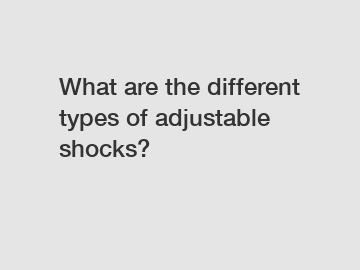What are the different types of adjustable shocks?
What are the different types of adjustable shocks?
Shocks play a crucial role in the performance and handling of a vehicle. They help maintain control and stability, ensuring a smooth and comfortable ride. Adjustable shocks, as the name suggests, offer the advantage of customization. With the ability to tune and adjust various settings, they provide drivers with the flexibility to fine-tune their vehicle's suspension. In this article, we will explore the different types of adjustable shocks and delve into their benefits and applications.
1. Gas Adjust Shocks:

Gas adjust shocks, also known as gas-filled shocks, utilize a combination of gas and oil to deliver improved damping performance. The gas chamber helps reduce foaming and aeration, preventing overheating and maintaining consistent damping characteristics. These shocks provide a comfortable ride on the highway while offering increased performance during spirited driving or off-road conditions. The adjustable feature allows drivers to fine-tune the compression and rebound damping settings to suit their preferences.
2. Coilover Shocks:
Coilover shocks integrate the coil spring and shock absorber into one unit, offering a compact and efficient suspension solution. This design allows for easy adjustability, making them popular in various motorsport applications. By adjusting the spring perch, drivers can modify the ride height, and by altering the shock settings, they can fine-tune the damping characteristics. Coilover shocks provide excellent handling performance, making them a preferred choice for racing enthusiasts and those seeking improved road-holding capabilities.
3. Electronic Adjustable Shocks:
Electronic adjustable shocks, often referred to as active or adaptive shocks, utilize sophisticated technology to continuously adjust damping characteristics in real-time. These shocks feature sensors that monitor various parameters such as wheel speed, body roll, and steering inputs. Based on this information, an electronic control unit adjusts the shock settings, providing optimal suspension performance for different driving conditions. Electronic adjustable shocks offer superior comfort while maintaining excellent handling and stability, making them popular in high-end luxury vehicles.
4. Remote Reservoir Shocks:
Remote reservoir shocks employ an external reservoir to increase the shock's oil capacity and dissipate heat more effectively. This design allows for better heat management, enhancing the shock's durability and consistency in performance. The increased oil capacity also reduces aeration, ensuring consistent damping under extreme conditions. Remote reservoir shocks are commonly used in off-road and racing applications, where performance and durability are critical. The adjustable feature empowers drivers to fine-tune the shocks for varying terrains or driving styles.
In conclusion, the world of adjustable shocks offers a variety of options to cater to different driving preferences and needs. Gas adjust shocks combine gas and oil for improved damping performance, while coilover shocks integrate the spring and shock absorber for enhanced handling. Electronic adjustable shocks utilize advanced technology to continuously adapt to changing driving conditions, and remote reservoir shocks offer superior heat management and durability. Each type of adjustable shock has its own advantages and applications, be it daily commuting, spirited driving, racing, or off-roading. By understanding these different types of adjustable shocks, drivers can make an informed choice to optimize their vehicle's performance and ride quality. So, the next time you find yourself wondering about the different types of adjustable shocks, remember the options available and choose the one that suits you best.
Contact us to discuss your requirements of Heavy-duty tension springs for medical devices, car coil spring supplier, automotive coil spring manufacturers. Our experienced sales team can help you identify the options that best suit your needs.
185
0
0

Comments
All Comments (0)